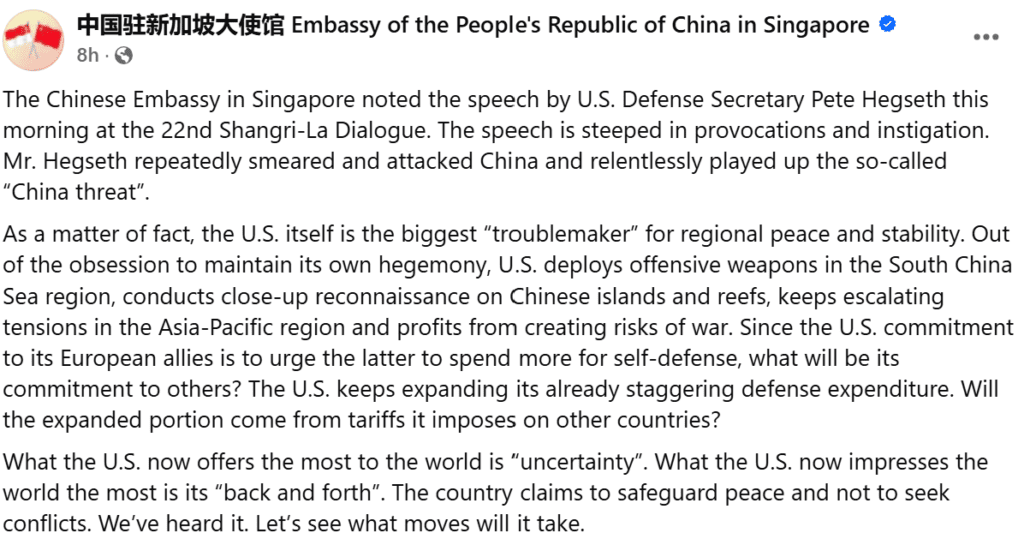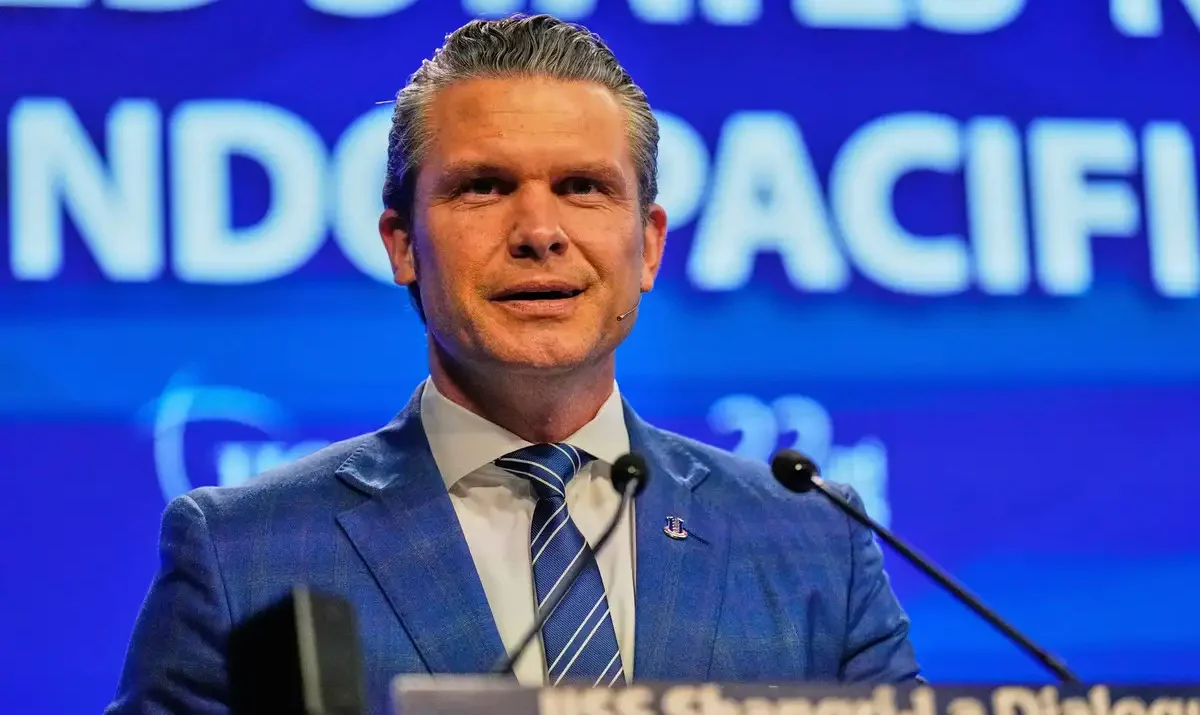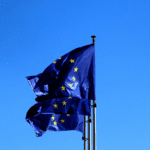In his first major appearance on the international stage, US Defense Secretary Pete Hegseth delivered a stark warning about China’s growing military threat, calling on America’s Indo-Pacific allies to dramatically increase their defense spending in the face of what he described as a “potentially imminent” crisis.
“There’s no reason to sugar coat it. The threat China poses is real, and it could be imminent,” Hegseth said at the Shangri-La Dialogue in Singapore on Saturday. “Any attempt by China to conquer Taiwan would result in devastating consequences for the Indo-Pacific and the world.”
Hegseth, a close ally of President Trump and former Fox News host, reaffirmed the administration’s Indo-Pacific priorities, emphasizing deterrence against Beijing while pressuring Asian allies to follow Europe’s lead in scaling up military investment.
Beijing Responds: “US is the Biggest Troublemaker”
The Chinese embassy in Singapore pushed back strongly, accusing Hegseth of “playing up the so-called China threat” and calling the US “the biggest troublemaker” in the region.
“Mr. Hegseth repeatedly smeared and attacked China,” the embassy posted on Facebook. “The U.S. itself is the greatest threat to regional peace and stability.”
China’s official delegation skipped the summit, sending only academics, while Defense Minister Dong Jun was notably absent.

Pressure on Indo-Pacific Allies
Hegseth’s remarks follow a broader Trump administration push to shift defense burdens onto allies. He cited Europe’s recent pledges — including Germany’s — to spend 5% of GDP on defense as a model for Asian nations.
“Thanks to President Trump, Asian allies should look to countries in Europe as a newfound example,” Hegseth said. “It doesn’t make sense for key allies in Asia to spend less in the face of an even more formidable threat — not to mention North Korea.”
Average defense spending in Asia stood at just 1.5% of GDP in 2024, according to the International Institute for Strategic Studies, despite rising regional tensions.
Still, some US lawmakers weren’t impressed by Hegseth’s tone. Democratic Senator Tammy Duckworth called his message “patronizing” to America’s Indo-Pacific partners, even while welcoming his reaffirmation of US commitment to the region.
Strategic Shift and Military Posture
Hegseth also addressed global defense alignment, suggesting that Europe should handle its own regional security, allowing Washington to focus on China and Indo-Pacific deterrence.
“We would much prefer the overwhelming balance of European investment be on that continent,” he said. “That way we can use our comparative advantage as an Indo-Pacific nation to support partners here.”
His comments came after the US moved air defense systems from Asia to the Middle East earlier this year — a decision that drew criticism as tensions with China and North Korea rise.
A Hardline Tone, a Familiar Message
In a nod to his domestic base, Hegseth reiterated themes from his tenure in US conservative circles:
“We’re not here to preach about climate change or cultural issues,” he said. “We respect your traditions and militaries. We want to work with you where our shared interests align.”
The speech signals that Trump’s second term will double down on military readiness and strategic competition with China, while expecting allies to share more of the burden. As tensions grow around Taiwan, North Korea, and South China Sea militarization, Washington’s message is clear: this is no time to cut defense budgets.
Disclosure: This article does not represent investment advice. The content and materials featured on this page are for educational purposes only.
Related:
Trump says he plans to double steel, aluminum tariffs to 50%
SEC Drops Binance Lawsuit in Major Win for Crypto – Trump-Linked Ventures Surge Ahead
From Chips to Humanoids: Nvidia CEO Jensen Huang Bold Vision for Future
Trump Taps Palantir to Build Massive Government Spy Network
Germany Considers 10% Digital Tax on Google, Meta – Risks New Clash With Trump
Appeals Court Reinstates Trump’s Tariffs – Legal Battle Heats Up
JD Vance: Bitcoin Is America’s Strategic Weapon Against China
US trade court blocks Trump’s sweeping tariffs. What happens now?
Trump orders US chip designers to stop selling to China
US Consumer Confidence Soars in May Amid Hopes for Trade Peace










